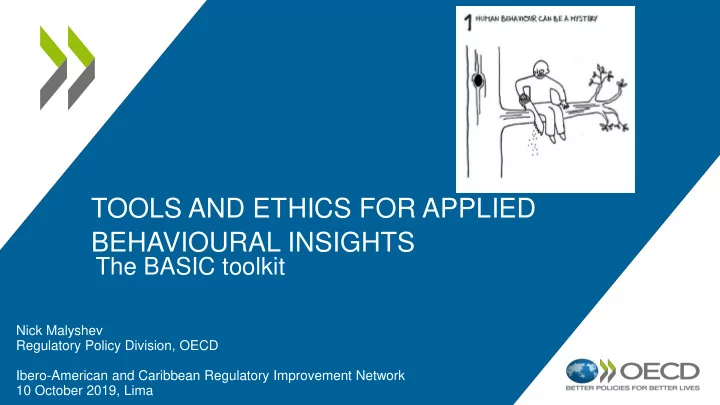

TOOLS AND ETHICS FOR APPLIED BEHAVIOURAL INSIGHTS The BASIC toolkit Nick Malyshev Regulatory Policy Division, OECD Ibero-American and Caribbean Regulatory Improvement Network 10 October 2019, Lima
Agenda 1. What are behavioural insights? 2. What is the BASIC toolkit and how was it developed? 3. What is the BASIC process?
WHAT ARE BEHAVIOURAL INSIGHTS?
So what are behavioural insights? • Lessons derived from the behavioural and social sciences, including decision making, psychology, cognitive science, neuroscience, organisational and group behaviour , which are being applied by public bodies with the aim of making public policies work better • Often involves the use of experiment and observation to identify patterns of behaviour and use these findings to inform policies and regulation • It is about inductive approach to policy-making
OECD Regulatory Policy Committee and Network of Economic Regulators • Regulatory Policy Committee (RPC): brings together over 100 central government officials to assists members and non-members in building and Energy strengthening their regulatory reform efforts World • Network of Economic Regulators (NER): brings Transport class Water regulators together over 70 regulators across sectors, 30 countries and regions of the world. Open forum that promotes dialogue, shares good practices, generates analysis and guidance. Telecoms
Extensive work developed since 2013 oe.cd/nudge
WHAT IS BASIC AND HOW WAS IT DEVELOPED?
The BASIC toolkit B EHAVIOUR A NALYSIS S TRATEGIES C HANGE I NTERVENTION Behaviour Analysis Solution A process framework for applying BI from start to finish on any policy problem, including tools, proofs of concept and standards Built to be used in conjunction with other frameworks for applying BI
Origins of the BASIC toolkit: demand from the community • 150 behavioural practitioners from governments, regulators, NGOs, academia, private sector, consumer bodies and multi- lateral bodies • Demand for tools to help policymakers apply BI more systematically to policy problems… • … and a set guidelines or structures to ensure BI is being used responsibly
BI around the world
BASIC: for the community, by the community • 250 practitioners and policymakers from 21 countries, many new to BI • Breakout groups on BASIC useful, needed simplification Revised and presented to the Regulatory Policy Committee and behavioural community for consultation Final revisions and comments
Key features of the BASIC toolkit 1. Brief : quick overview for senior leaders and policy makers of why behavioural insights matter to address the problems faced by governments and citizens. 2. Guidebook : practical instrument for policy officials working in ministries, departments and public agencies on what is the process through which the behavioural aspects of a problem can be identified, scoped and addressed. 3. Manual: how-to for policy officials and practitioners working with public agencies on applying BI to public policy, as well as a repository of approaches, proofs of concepts and methodological standards for designing and implementing a behaviourally-informed policy intervention 4. Ethical guidelines : Overall, before starting to work with BI and by each BASIC stage
WHAT IS THE BASIC PROCESS?
Behaviour: Identifying and defining the problem 1. What are the behaviours driving the policy issue? 2. Which behaviour(s) should you target? 3. What is your desired policy outcome? 4. What is the context shaping target behaviours?
Analysis: Understanding why people act as they do
Strategy: Changing behaviours Identify behaviourally informed strategies that can • effectively change the identified behaviours Behavioural Strategy Impact driver Attention Send SMS reminders that include the 25% reduction in missed cost of a missed appointment to the appointments health system Belief formation Paint a series of white lines to create the 36% fewer crashes in 6 illusion of speeding up so people slow months down Choice Send letters to utility customers 2.0% reduction in electricity comparing their electricity consumption (450k tonnes consumption to that of neighbours and USD 75 million) Determination Create a “commitment pack” that 23% more job seekers found includes meeting with an employment work advisor to create an actionable job- hunting plan • Policy makers should have a preliminary understanding of these strategies, but should have the support of behavioural experts as well
Intervention: Introduction to testing Simplified RCT SAMPLE But also: Randomisation Alternatives GROUP 1 GROUP 2 when RCT is not possible No change in school attendance Intervention No Intervention Decrease in school attendance TREATMENT GROUP CONTROL GROUP Increase in school attendance
Change: Implementing behaviourally-informed policies 1. Revisiting the political context and project level 2. Implementing and scaling behaviourally informed policies 3. Setting up monitoring of long-term and potential side effects 4. Maintaining the policy initiative 5. Disseminating knowledge widely
Ethical guidelines • General guidelines – Always conduct an ethical evaluation of behaviourally informed interventions – Public acceptance of BI does not make it always ethically permissible. – Carefully consider issues related to consent and awareness • Before beginning an intervention – Consider establishing an ethical review board – Ethical supervision of data collection, use and storage – Observe existing ethical guidelines and codes of conduct • Specific guidelines by each stage of BASIC
Where and how to use BASIC oe.cd/BASIC 1. OECD publication: All 2. Brochure: Easy-to-use three pieces in one brief + guidebook Test and adapt to your setting
Thank you! For more information: oe.cd/nudge Contact: Nikolai.Malyshev@oecd.org
Recommend
More recommend